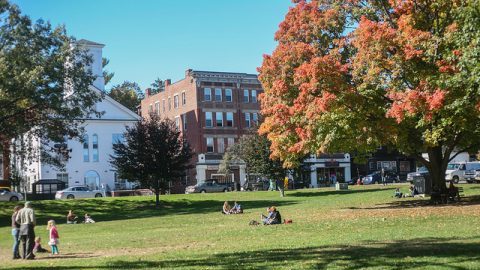Hyper-sensitivity has become the norm on college campuses across the country. In 2015, the University of New Hampshire put out a language guide which declared the word “American” offensive. North Carolina State University backed an instructor who docked students’ grades for the use of sexist terminology like “mankind,” and an opinion piece written in the student newspaper of Swathmore College described hating pumpkin spiced lattes as a sexist attack on women.
A wave of political correctness is sweeping over this country—and now Amherst has been caught in its riptide.
On September 5 the Massachusetts Daily Collegian reported that Amherst officials have been petitioned to rename the town, with Norwottuck suggested as a potential replacement. Amherst is named after Lord Jeffery Amherst, a British general who advocated for the use of biological warfare against Native Americans. William Bowen of Belchertown, the author of this petition, wrote that using the name “Amherst” was “like naming a town after Adolf Hitler.”
But the solution to our city’s ugly legacy isn’t to sweep it under the rug—it’s to embrace it. Renaming the town would be an attempt to wash the public consciousness clean of our history and ignore the fact that the name “Amherst” has come to represent much more than some colonial lord.
Proponents of the name-change will say that living under the Amherst name makes us complicit in the oppression that our forefathers dealt. To them, asking the people of Amherst to change the town’s name is no different than asking Southerners to take down Confederate statues. Yet, while there’s no denying that Jeffery Amherst did terrible things, the atrocities of the past are on our ancestors, not us.
Indigenous people suffered at the hands of Lord Amherst—but their strength in the face of oppression needs to be honored, not forgotten. We can change the name of the town, but we can’t undo history. A name change would push the crimes committed out of the consciousness of future generations, robbing them of an important lesson. A name tied to an ominous figure isn’t a sign of continuing oppression, but a testament to how far we’ve come—and why we’ll never go back.
When I hear the name Amherst, my first thought isn’t Lord Jeffery. I don’t think of some dusty lord, but of a quaint college town, elite universities and Antonio’s by the slice. Amherst is Puffer’s Pond, the tallest college library, Insomnia Cookies and that crazy old guy who waves signs around in the center of town. Most importantly, Amherst is home. The movement to strip Amherst of its name forgets the amazing community that name has come to represent.
Renaming a town isn’t the same as taking down a Confederate statue or another monument to slavery. Someone like Robert E. Lee will only be remembered for one thing—waging war to keep Black people in chains. The name “Amherst,” on the other hand, has come to signify something much greater than its dark history would suggest.
Amherst should take this opportunity to make a statement against political correctness: We might not be proud of our history, but we aren’t going to start denying it. Keeping the name is an opportunity to drive dialogue and learning, so it’s good news that this petition isn’t likely to be granted anytime soon. We’re in luck—who really wants to be known as the University of Massachusetts Norwottuck anyway?
Bradley Polumbo is a Collegian columnist and can be reached at [email protected].




















Blake • Sep 13, 2017 at 1:07 pm
The whole point of taking down racist monuments and renaming cities is to revitalize and refresh that terrible history in our minds, not to erase it. Do you think Amherst’s deeds are mentioned in history classes in our public schools today? No, because men like him are always portrayed as great men and builders of towns. Your argument might have some traction if our history classes did teach about colonial atrocities, but since there has been no such effort in any major way, I’m afraid your attempt to argue for geographies named after genocidal colonial powers falls flat. The whole point of making these changes would be pointing out that history, making sure it is mentioned in the pages of our history books.
Peter Lewicke • Sep 14, 2017 at 2:56 pm
“Those who cannot remember the past are condemned to repeat it.” George Santayana
Removing the memorials is a way of erasing history. If history hasn’t been erased for you, then you would know why Jeffrey Amherst was a great hero, a hero for liberalism and an enemy of those who made war against women and children. Try learning what happened in the past, so that we might avoid repeating some of it.
https://www.bustle.com/p/13-quotes-from-1984-that-are-horrifyingly-relevant-in-2017-33324
Kevin Bush • Sep 11, 2017 at 11:37 am
Ole Lord Jeff musta been way ahead of his time …as germ theory proper wasn’t developed till after the telephone was invented …
Nitzakhon • Sep 11, 2017 at 10:18 am
It is the current version of Mao’s “Cultural Revolution” where screaming mobs of students worked to erase history… so that the new Socialist Utopia could be created.
The modern rewriters of history are domestic enemies.
Peter Lewicke • Sep 11, 2017 at 9:12 am
This piece is barely better than the other recent articles about Jeffrey Amherst. General Amherst did not engage in biological warfare; although he may have wondered about it. He was a real war hero, and that was why the town was named for him.
And it is doubtful whether the method would have been effective, if he had handed out blankets:
“The virus which causes smallpox is contagious and spreads through person-to- person contact and saliva droplets in an infected person’s breath.” http://www.who.int/csr/disease/smallpox/faq/en/